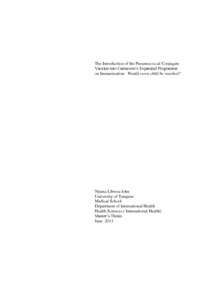THE INTRODUCTION OF THE PNEUMOCOCCAL CONJUGATE VACCINE INTO CAMEROON'S EXPANDED PROGRAMME ON IMMUNISATION: Would every child be reached?
NJUMA LIBWEA, JOHN (2011)
NJUMA LIBWEA, JOHN
2011
International Health, HES
Lääketieteen yksikkö - School of Medicine
This publication is copyrighted. You may download, display and print it for Your own personal use. Commercial use is prohibited.
Hyväksymispäivämäärä
2011-08-18
Julkaisun pysyvä osoite on
https://urn.fi/urn:nbn:fi:uta-1-21723
https://urn.fi/urn:nbn:fi:uta-1-21723
Tiivistelmä
Pneumonia like many other communicable infections is vaccine-preventable, but the increasing death toll resulting from the disease globally is a call for concern; partly attributed to the incomplete vaccine coverage in children. There are several factors why vaccines have failed to reach every child. Most of these include the perceptions, knowledge, attitudes and practices of parents/guardians and healthcare providers. Previous studies on the introduction of new and under-utilized vaccines as is the case with the Pneumococcal Conjugate Vaccine (PCV) have focused on experimental trials, coverage figures and vaccine efficacy in developed countries. Little attention has been given to the factors which may hinder the implementation process despite the great challenges this may encounter in developing countries.
The present study explored the essential issues in the introduction of the PCV in two health districts in Yaounde, Cameroon to ensure that every child is reached. The objectives of the study were to describe the knowledge, attitude and practices of parents/guardians on pneumonia and immunisations/EPI vaccines. It also aimed to identify the parental socio-economic/demographic characteristics that are predictive of good knowledge on pneumonia infections and EPI vaccines. Finally, the study described health center personnel perceptions about immunisations prior to the PCV introduction into the EPI.
A cross sectional study design was adopted and targeted parents/guardians (n=205) of children aged 0-59 months and health centre personnel (n=13) directly involved with vaccination activities in two health districts in Cameroon. The WHO’s immunisation coverage cluster survey design was used to select the subjects with a response rate of 79.3%. The study was conducted between July-September 2010. Descriptive statistics and multivariate logistic models were used to analyse the parental/guardian data while the health personnel data was only analysed descriptively. SPSS version 17.0 was used as the analytical tool.
The knowledge, attitudes and practices of the respondents were found to be generally good and positive about pneumonia disease burden and immunisations/EPI vaccines. However, only 19% of the parents/guardians were aware of the availability of the PCV. Most parents/guardians were of the opinion that increased sensitisation/mass vaccination campaigns would remain essential for the PCV to reach every child. Logistic modelling identified associations between; - educational level and parental knowledge on the consequences/seriousness of pneumonia infections, income and parental knowledge on pneumonia causes/risk factors, occupational level and parental knowledge on pneumonia prevention beside that of region of origin and parental knowledge on the availability of the PCV. Also, a friendly attitude from health personnel was thought to motivate parents/guardians to respect vaccination schedules.
According to parents/guardians, the strongest factors promoting wide access to the PCV are public sensitisation/mass vaccination campaigns and use of social network avenues. Hence, a short and clear message on the dangers of pneumonia and the need for prevention provided to parents/guardians by health personnel during sensitisation/out-reach campaigns would be primordial, if the PCV is to reach every child.
Asiasanat:knowledge, attitudes, practices; parents/guardians; health personnel; PCV; EPI; new vaccine introduction; pneumonia; Cameroon; vaccinations/immunisation, Sub-Saharan Africa
The present study explored the essential issues in the introduction of the PCV in two health districts in Yaounde, Cameroon to ensure that every child is reached. The objectives of the study were to describe the knowledge, attitude and practices of parents/guardians on pneumonia and immunisations/EPI vaccines. It also aimed to identify the parental socio-economic/demographic characteristics that are predictive of good knowledge on pneumonia infections and EPI vaccines. Finally, the study described health center personnel perceptions about immunisations prior to the PCV introduction into the EPI.
A cross sectional study design was adopted and targeted parents/guardians (n=205) of children aged 0-59 months and health centre personnel (n=13) directly involved with vaccination activities in two health districts in Cameroon. The WHO’s immunisation coverage cluster survey design was used to select the subjects with a response rate of 79.3%. The study was conducted between July-September 2010. Descriptive statistics and multivariate logistic models were used to analyse the parental/guardian data while the health personnel data was only analysed descriptively. SPSS version 17.0 was used as the analytical tool.
The knowledge, attitudes and practices of the respondents were found to be generally good and positive about pneumonia disease burden and immunisations/EPI vaccines. However, only 19% of the parents/guardians were aware of the availability of the PCV. Most parents/guardians were of the opinion that increased sensitisation/mass vaccination campaigns would remain essential for the PCV to reach every child. Logistic modelling identified associations between; - educational level and parental knowledge on the consequences/seriousness of pneumonia infections, income and parental knowledge on pneumonia causes/risk factors, occupational level and parental knowledge on pneumonia prevention beside that of region of origin and parental knowledge on the availability of the PCV. Also, a friendly attitude from health personnel was thought to motivate parents/guardians to respect vaccination schedules.
According to parents/guardians, the strongest factors promoting wide access to the PCV are public sensitisation/mass vaccination campaigns and use of social network avenues. Hence, a short and clear message on the dangers of pneumonia and the need for prevention provided to parents/guardians by health personnel during sensitisation/out-reach campaigns would be primordial, if the PCV is to reach every child.
Asiasanat:knowledge, attitudes, practices; parents/guardians; health personnel; PCV; EPI; new vaccine introduction; pneumonia; Cameroon; vaccinations/immunisation, Sub-Saharan Africa
